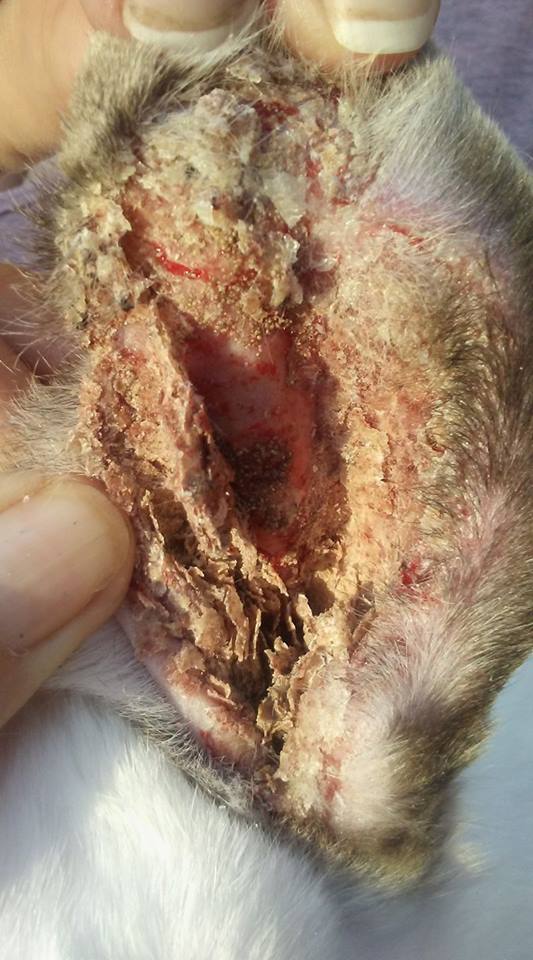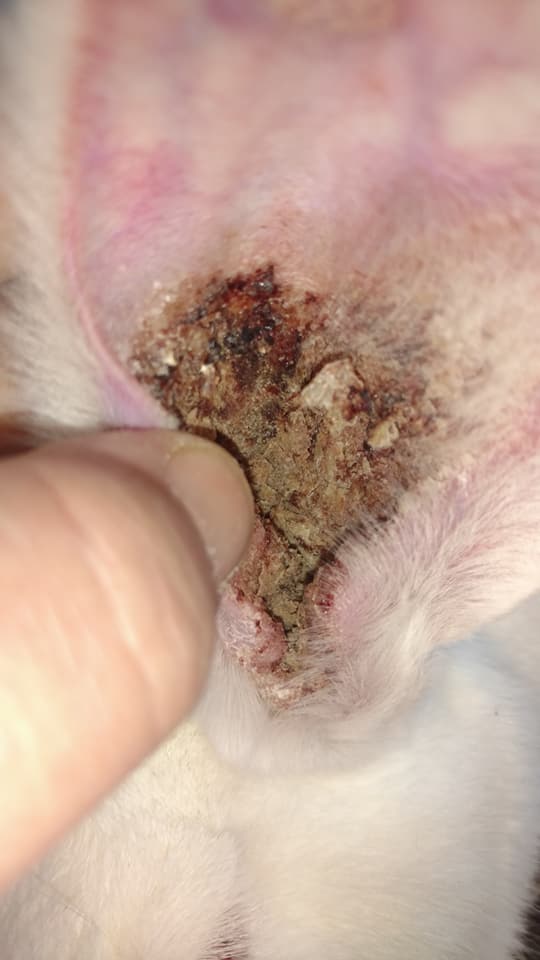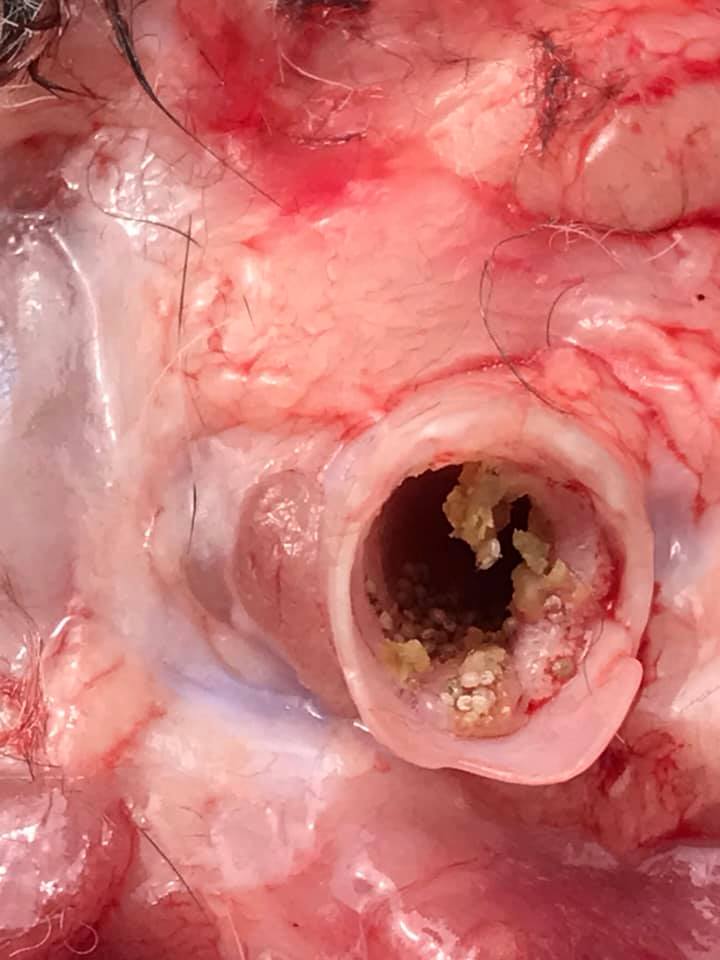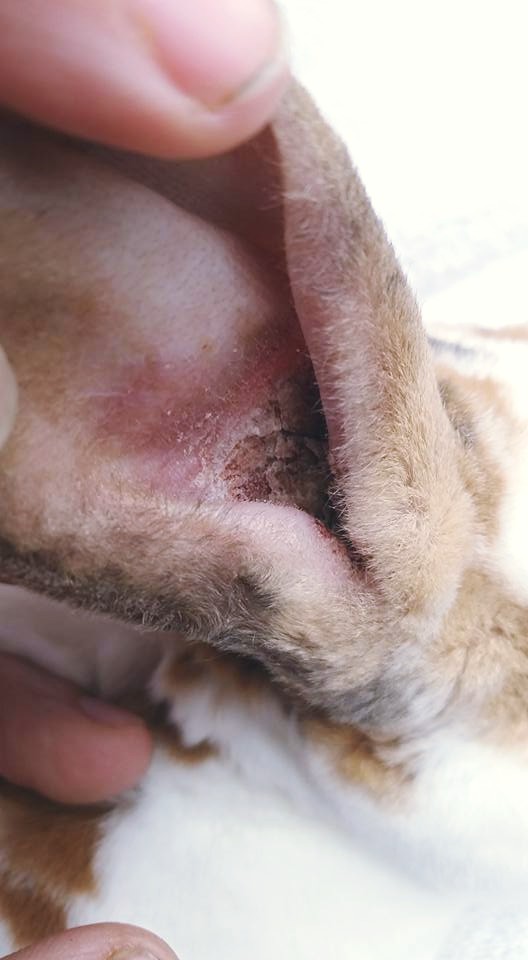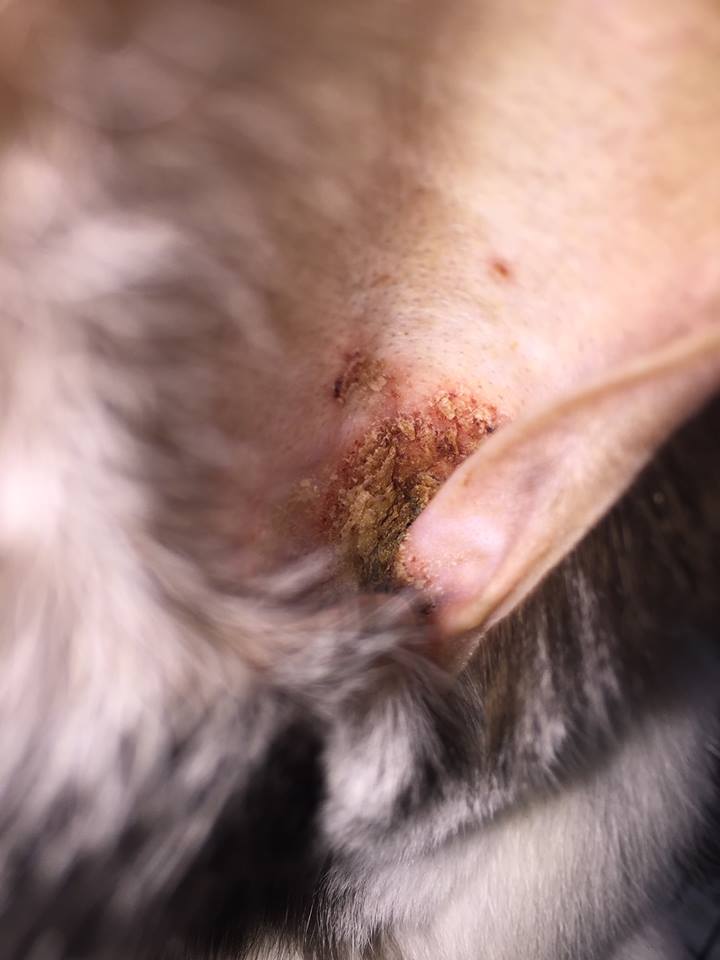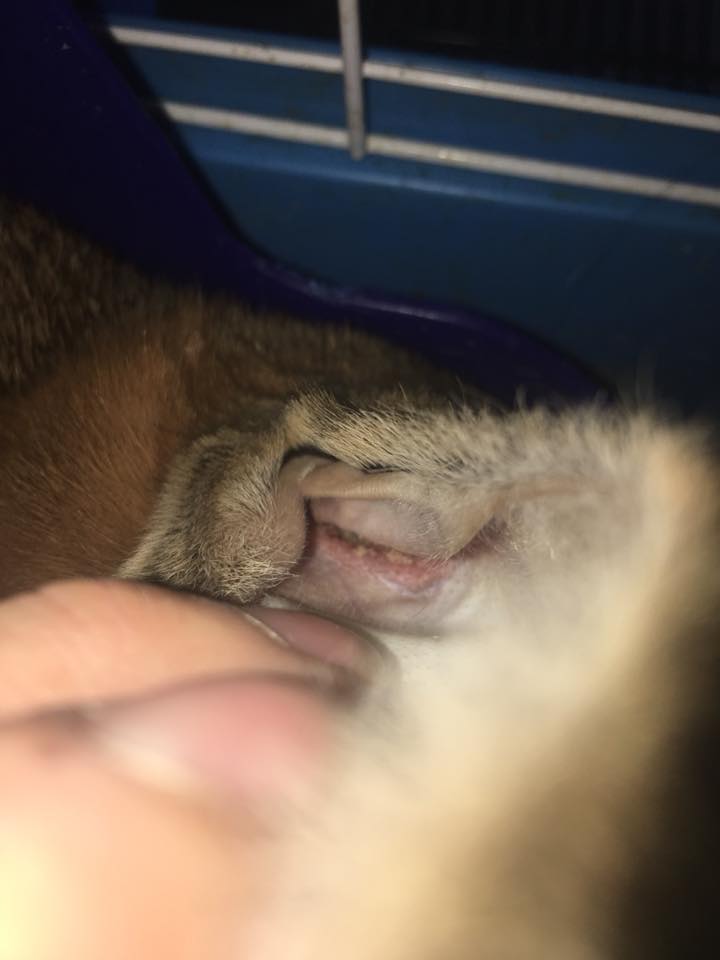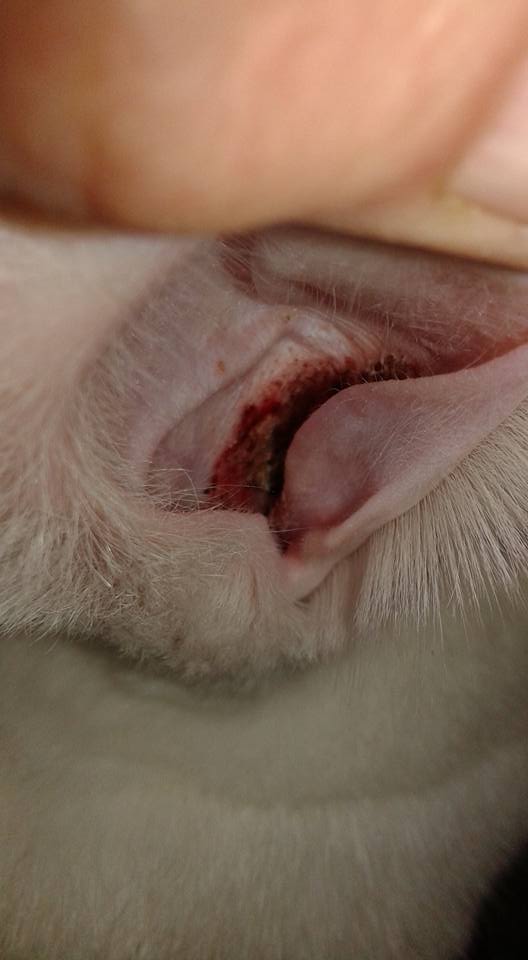I’m going to share with you the best way to eliminate ear mites in rabbits without using harmful chemicals.
Ear mites are extremely painful and can spread throughout your rabbitry very quickly.
When curing ear mites in rabbits it’s very important that you use a natural remedy that works quickly. I’m going to share with you the single best way to eliminate ear mites and heal your rabbits’ damaged ears at the same time.
All images courtesy of individuals, sharing for educational purposes.
What are Ear Mites in Rabbits?
Ear mites in rabbits are called Psoroptes Cuniculi. These mites are common in domestic rabbits that have poor immunity to parasites.
These mites are easily spread among rabbits and can infect one or both ears, causing irritation, redness and crusting in the infected ears.
Ear mites in rabbits cause extreme discomfort and pain for your rabbit and if they are not treated, the mites can cause secondary infections.
The good news is that natural treatment is easy and very effective.
Symptoms of Ear Mites in Rabbits
Ear mites in rabbits cause irritation to the lining of the ear and lead to the formation of thick brown crusts. If left untreated they can severely damage the ear canals and eardrum and can even cause permanent hearing loss.
Keep in Mind: A rabbit that has ear mites may or may not show symptoms of infestation until it is advanced and one or both ears may be affected.
Signs of Ear Mites in Rabbits
- Scratching
- Shaking their head and ears
- Head tilt (carrying their head to the side)
- Bleeding
- Chewing their ears
- Inflammation
- Crusting
- Thinning hair
Ear Mite Lifecycle
Ear mites mostly live along the surface of the ear canal. They can also be found on other parts of the body, especially the neck, back and tail. Ear mites in rabbits are easily transmitted to other pets, but humans are not affected.
The life-cycle of the ear mite takes approximately 21 days to complete.
The below picture is of the ear canal of a butchered rabbit. Look closely and you can see the eggs.
Ear Mite Life-Cycle Stages
- Eggs are laid on the surface of the ear canal and take about 4 days to hatch.
- After they hatch the larvae feed for a few days then rest for a day before molting to form the nymph stage.
- The nymphs feed for 4 days then molt again (2nd time).
- The nymphs feed again for another 4 days, then molt (3rd time).
- After molting once more (4th time) they become adults.
Adult ear mites feed off the skin flakes and secretions in the ear canal and lay their eggs to begin the next generation.
Start Treating Your Rabbit Early On
Early Stages: In early stages of infestation, the ear mites live in the deeper parts of the rabbit’s external ear canal. You won’t be able to see them at this stage and may not realize there is a problem.
Moderate Stages: As the infestation progresses it slowly becomes visible. The ear mites will multiply, leading to more crusting and inflammation and extending from the rabbit’s ear canal.
Advanced Stages: If left untreated, ear motes in rabbits cause more and more crusting that can end up covering the entire ear.
Are Ear Mites in Rabbits Contagious?
Ear mites are very contagious and are spread through direct and indirect contact with an infected rabbit.
It’s not uncommon for an entire rabbitry or rabbits to get ear mites from one carrier. The mites will climb from one rabbit to another, and from cage to cage. The risk of transmission is higher when rabbits live close to each other.
How Long do Mites Live?
Mites are able to survive away from their host for days to weeks depending on humidity and temperature.
This means that you must be vigilant about ridding not only your rabbit(s) of mites but also their environment.
Through the hands and clothes of the rabbit owner or caretaker from handling more than one rabbit
Why Did My Rabbit Get Ear Mites?
Infestations are typically worse when rabbits are living under stress (internal or external stress).
Types of stressors:
- Small enclosures
- Loud noises
- Limited access to food and/or water
- Living with a dominating rabbit (getting picked on)
- Extreme weather
- Poor diet
- Predators
Treating Ear Mites in Rabbits Naturally
If you choose to take your mite-infested rabbit to the vet you’ll walk away with a chemical treatment that will likely get rid of the mites but will not only cost you much more than a natural remedy, it will have negative effects on your rabbit’s immunity and will not prevent mites from returning.
With a natural treatment, you can eliminate the mites while also giving your rabbit’s immunity a boost and safely use the treatment regularly (once a month or so) to prevent ear mites. Plus, you’ll save money to boot.
Why Coconut Oil?
Coconut oil is rich in medium-chain fatty acids which make up about 65% of its total composition.
The fatty acids in coconut oil include:
- Lauric acid: 49%
- Myristic acid: 18%
- Caprylic acid: 8%
- Palmitic acid: 8%
- Capric acid: 7%
- Oleic acid: 6%
- Linoleic acid: 2%
- Stearic acid: 2%
These medium-chain fatty acids in coconut oil have antimicrobial properties that help protect against harmful microorganisms.
Specifically, it’s the lauric acid in coconut oil which makes up nearly 50% of the fatty acids, that fights harmful microorganisms.
In a study on antibacterial properties, 30 types of fatty acids were tested against 20 different strains of bacteria. Lauric acid was found to be the most effective at blocking the growth of the 20 bacteria strains.
Furthermore, like lauric acid, capric acid has been shown to have potent antimicrobial properties.
A test-tube study showed that both lauric and capric acid effectively killed off strains of cocci, and another test-tube study showed that it was able to inhibit the growth of certain types of fungi.
Coconut Oil Reduces Inflammation
Studies have shown that coconut oil may relieve inflammation by improving antioxidant status and decreasing oxidative stress.
In one study, researchers applied virgin coconut oil to the inflamed ears of rats. Not only did coconut oil have anti-inflammatory effects, but it also relieved pain as well.
A 2013 study fed rats different types of oil, including coconut oil, olive oil and sunflower oil. At the end of the 45-day study, virgin coconut oil had improved antioxidant status and prevented oxidative stress better than all other oils.
How to Apply Coconut Oil
It’s simple. A few drops of warm (not hot) oil in each ear will suffocate the ear mites, killing them.
For a rabbit that has a severe case, cover the ear in a layer of warm (not hot) oil.
Daily applications of coconut oil will safely and effectively eliminate ear mites in rabbits.
Though it’s tempting to try to remove them, leave the scabs and crusting to fall off on their own. With each oil application, you’ll notice less and less scabbing and crusting.
When you apply the coconut oil expect your rabbit to shake its head. They don’t like the feeling of oil in their ears. It helps to lightly massage the ears after application if the case of ear mites isn’t too severe. If the case is severe, massaging is too painfull and could break the skin.
Apply the oil every day for a week or until the ear mites are visibly gone, then 1-2 times per week for the remainder of the month.
Even if you only see ear mites in one ear it’s always best to treat both ears and a few drops of coconut oil down your rabbit’s back doesn’t hurt either.
Treat Your Whole Rabbitry
Coconut oil is so inexpensive and applying the oil to ears is so easy that it’s really worth taking the time to treat every one of your rabbits and any other animals (dogs, cats, etc.) that hang around your rabbitry.
Once your rabbits are cured of the ear mites you can apply the oil once per month as a natural ear mite preventative.
Naturally preventing ear mites in rabbits helps keep them healthy and better able to resist not only mites but other infestations, parasites and illnesses as well.
